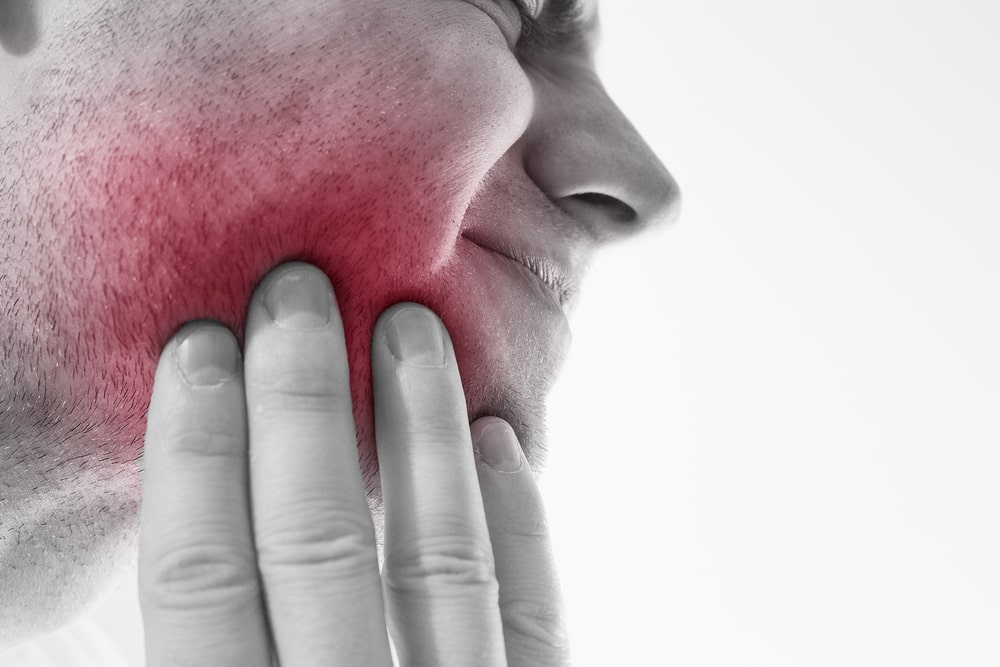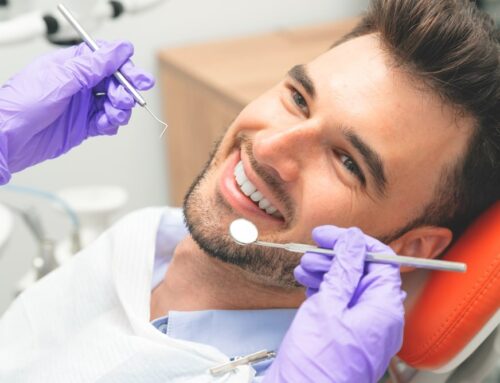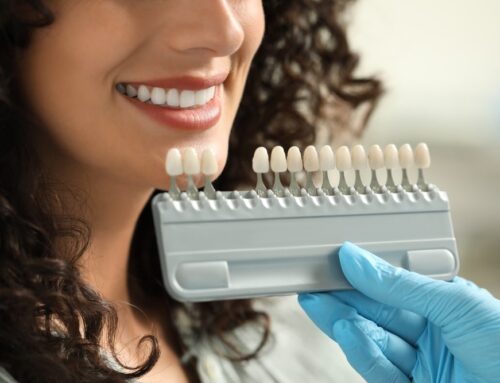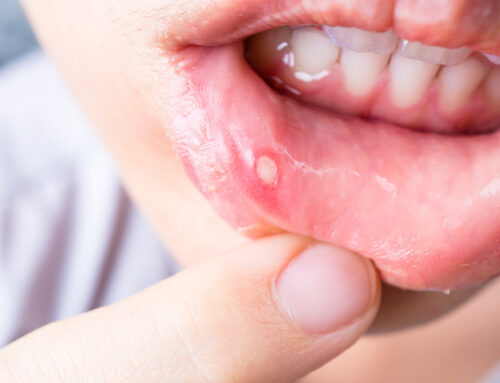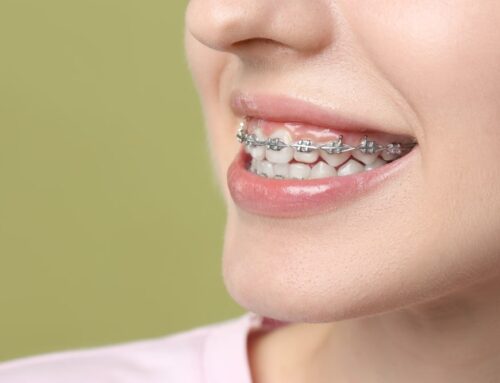Tooth pain when biting down or touching your teeth isn’t something you should ignore. It can signal an underlying dental issue that may get worse without treatment. In many cases, seeing an emergency dentist can help you get relief fast and avoid long-term complications.
Let’s break down the top 7 causes of tooth pain when biting down or touching teeth—and how an emergency dentist can help.
7 Common Causes of Tooth Pain
1. Cavities
As kids, we were often told to avoid sugary foods—and for good reason. When sugar interacts with plaque bacteria in your mouth, it becomes acid. This acid wears down enamel, the protective layer of your teeth, leading to decay.
As the enamel weakens, small holes form in your teeth, known as cavities. Cavities often develop without obvious symptoms. In fact, the first sign might be the tenderness you feel when biting down or touching the affected tooth.
2. Alignment
Tooth alignment is so important there’s an entire dental practice dedicated to it—orthodontics. When your teeth are misaligned and your bite doesn’t come together properly, it can lead to uneven or excessive wear. This often causes jaw pain and discomfort when biting down.
3. Sinus Congestion
Not all dental pain is caused by a dental issue. The roots of your upper teeth sit very close to your sinuses, so pressure, congestion, or infections can cause tooth pain. Known as a “sinus toothache,” this pain is usually felt in the upper back teeth near the sinuses. If the tooth pain when biting or touching your teeth occurs in a group of teeth rather than just one, your sinuses might be the cause.
4. Periodontitis
Periodontitis, the result of untreated gingivitis, can cause severe oral pain. Overall dental health involves maintaining not only your pearly whites but also your gums, which stabilize your teeth.
Poor oral hygiene can lead to gingivitis—the accumulation of bacterial plaque around your teeth. If left untreated by an emergency dentist, it can harden into tartar and trigger an immune response. This response can lead to gum tissue deterioration and cause red, bleeding, tender gums, dental pain, and in extreme cases, tooth loss.
5. Detached fillings or crowns
The average lifespan of fillings and crowns is between 10 and 15 years, meaning the dental work you got as a teen may be the cause of your tooth pain. When a filling or crown becomes loose, bacteria become trapped beneath it, causing irritation to the tooth and, in some cases, the nerves. Biting down or touching a loose filling or crown can antagonize the already irritated tooth, causing sharp pain.
6. Dental Abscess
If you feel pain in a specific tooth when biting down, it could be caused by a dental abscess near the root. This type of infection creates a pocket of swelling inside the bone, which puts pressure on the tooth and surrounding tissues, leading to discomfort when pressure is applied.
Symptoms can come and go—some days the pain may be intense, while on others it might fade. You may also notice a small pimple-like bump (called a fistula) on the gums near the affected tooth, often releasing a salty-tasting fluid.
The most effective way to save an abscessed tooth is to visit an emergency dentist for a root canal, which removes the infection and relieves the pressure.
7. Cracked Tooth
A cracked tooth is one of the trickiest dental issues to diagnose. In many cases, the only symptom is sharp pain when you bite down or touch the tooth. If you notice discomfort after eating, try to pinpoint the area it’s coming from.
At our office, we use a special bite stick to apply pressure to specific spots on the tooth. This helps identify cracks that aren’t visible to the eye or detectable on X-rays. While larger fractures may appear on an X-ray, fine hairline cracks usually don’t. That’s why additional testing is often needed to confirm if a crack is present.
How an Emergency Dentist Can Help
Treat Cavities
If a cavity is the cause of your tooth pain when biting down or touching your teeth, your emergency dentist will fill it to restore the tooth’s function and integrity. Proper treatment will also prevent the decay from spreading deeper or impacting nearby teeth.
Alleviate Unexplained Tooth Pain
Maybe you bit down improperly, or perhaps you took a hit to the jaw during a sporting activity, or maybe you have no idea what’s causing your tooth pain when you bite down.
While your unexplained tooth pain could stem from numerous factors, you don’t have to live in pain while waiting for an appointment. Our emergency dentists in Aridire will thoroughly examine your teeth to determine what’s causing the pain and treat it immediately.
Soothe Mouth or Jaw Inflammation
Inflammation or swelling can be caused by any number of factors, from jaw or mouth infections to swollen lymph nodes. This can make it difficult to pinpoint exactly what’s causing your pain. Our dentists will inspect your teeth to find the source of the oral swelling, and treat the condition before it worsens.
Relieve Bleeding Gums
It’s normal for your gums to bleed mildly with known dental problems such as plaque build-up or gum disease. However, if your gums are bleeding continually and are accompanied by pain or inflammation, do not hesitate to reach out for emergency assistance. Contact your dentist as soon as possible.
Replace a Missing Crown or Filling
When a filling or crown loosens, you’ll likely know fairly quickly—often occurring as a weird taste of pennies inside your mouth. Regardless, don’t brush off the strange feeling or taste. Instead, contact your emergency dentist as soon as possible. Waiting too long will only worsen the problem and may result in more serious procedures such as a root canal.
Fix Broken, Chipped, or Cracked Teeth
A damaged tooth can lead to intense pain. If it’s been knocked out, it may also cause significant bleeding. Without prompt care, you risk permanent tooth loss. Delaying treatment can lead to more invasive procedures and higher costs.
Heal an Abscessed Tooth
You might not realize you have an abscessed tooth right away—but the pain makes it hard to ignore. An abscess can severely affect your ability to eat, speak, or even breathe comfortably. Common symptoms include:
- Difficulty talking
- Trouble breathing
- Struggle to eat or drink
- Pain anytime anything touches your teeth
Don’t wait for the pain to get worse. Book an appointment with your emergency dentist today and get the relief you need.
Treat Exposed Nerves
Exposed nerves can cause intense, constant pain—making it hard to focus on anything else. If the pain from an exposed nerve or abscessed tooth suddenly disappears, that’s not a good sign. It may mean the nerve is so damaged that it no longer sends signals, indicating a serious issue.
Don’t ignore it. An emergency dentist can treat the problem and help relieve your pain before it gets worse.
Your Next Step: Contact Your Emergency Dentist in Airdrie
Tooth pain can be stressful, but getting the right care quickly makes all the difference. At Yankee Valley Dental, we’re here to help—whether you’re dealing with sudden pain, a cracked tooth, or an infection.
Our experienced team of emergency dentists provides same-day dental care whenever possible, in a calm and supportive environment. We’ll assess the issue, relieve your pain, and guide you toward the right solution—so you can get back to eating, smiling, and living comfortably.
Contact Yankee Valley Dental in Airdrie today to book your emergency appointment. We’re here when you need us most.
Frequently Asked Questions
What are the common causes of tooth pain when biting down or touching my teeth?
Tooth pain when biting or touching can be caused by a variety of issues, such as cavities, cracked teeth, gum disease, tooth sensitivity, or a dental abscess.
Can tooth pain when biting down indicate a serious dental problem?
Yes, tooth pain when biting down could be a sign of a serious condition like a deep cavity, a cracked tooth, or even an infection. It’s important to see an emergency dentist as soon as possible for a proper diagnosis.
What can I do at home to relieve tooth pain when biting down?
Over-the-counter pain relievers, warm saltwater rinses, and avoiding hard or chewy foods can all help relieve the pain. That said, it’s best to consult a dentist for a long-term solution.
Can tooth sensitivity cause pain when touching my teeth?
Yes, tooth sensitivity, which is often caused by exposed roots, worn enamel, or gum recession, can lead to sharp pain when touching the teeth or consuming hot or cold foods and drinks.

